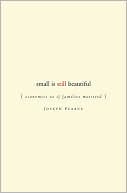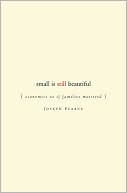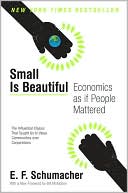Part IV, and final part, of the book review and summary of Small is Still Beautiful by Joseph Pearce. See Part III here, See Part II here, and Part I here.
Finally, the book reiterates EF Schumacher’s call for a fundamental shift in the way we frame economics to include a strong consideration of human values and lifestyles. This is a variation of the idea that if the mind is pure, the land is pure – a concept Schumacher should be familiar with from his research in his development of “Buddhist economics.” If we correct our realization of what is important in life, our economy, our society, and our environment will improve. Economics also ought to understand the interdependence of each ecological phenomenon, whether it is a cow, a fruit tree, grain fields, insects, birds, and so forth. Finally, economics should focus on the quality of life of people, rather on the quantity of material production.
Schumacher differentiates the difference between need and greed. The idea that “need is limited, but greed is unlimited” is best connected to the realization that Earth is not actually overpopulated, but rather its people have become too greedy, through Gandhi’s statement that “Earth provides enough to satisfy every man’s need, but not every man’s greed.” Quite simply, if people were to reduce their materialism, then more natural resources would be available for more people. Thus, our ‘overpopulation’ is actually a result of greedy, materialistic lifestyles that drain our natural resources beyond sustainability.
The author then examines the wrong attitudes that have led to our environmental, ecological, and socio-economic crises. The first factor he identifies is our collective misunderstanding of greed. According to Pierce, materialism and greed come from the spiritually ignorant belief that richer is happier. Of course, empirically this is wrong. Studies that compare changes in GDP, values, and happiness from the 50s, 70s, and 90s demonstrate that as GDP increase and people become more monetarily and career driven, happiness decreased drastically.
A lack of proper education perpetuates these unrealized, but still wrong, mentalities:
The meaning of life is not, it seems, important to our education. (emphasis mine) Instead the modern world has sacrificed concepts of right and wrong, of ethics and morals, on the altars of technolatry and economic growth. Awhile science takes centre stage, philosophy is not to be found anywhere on the national curriculum. Children are not expected to ask why, merely to know how. (emphasis mine)
The author asserts that our society is inundated with ideas that place the self at the center of the universe, with hedonism as its natural conclusion. With hedonism, the emphasis is on pleasing oneself in the short-term, and the vision for the long-term, such as sustainability and fulfillment, is lost. Human relationships are ignored, labor is seen as an annoyance to be eliminated instead of a source of fulfillment, and an emphasis is placed on consumption of goods. This results in the mindless destruction of our natural environment. Because modern men and women hardly care about family, much less strangers, they do not care that these economic activities put his children’s future at stake. However, cultivating virtue reverses these wrong views and is essential to returning the modern world to a sustainable and fulfilling world.
The book concludes with the “seven life-giving virtues” that summarize Schumaher’s vision for the human heart:
First is nonviolence. We must learn to live in harmony with each other and with nature. To do otherwise is to harm ourselves and our environment. Either the gentle shall inherit the earth or nobody will.
Second is smallness. Humans are human-sized and need a human-sized future. We need to live in such a way that the wholeness of our nature – soul and body and spirit – can flourish.
Third is satisfaction. We need to remember that to be satisfied is to have enough, not more than enough. We need to temper our selfish desire through self-sacrifice and self-limitation.
Fourth is humility. Without a sense of our own smallness, through humility, we will be subject to the sin of pride, which is at the heart of human greed and self-centeredness. As individuals we are important, but not all-important.
Fifth is cooperation. We must work with each other, not against each other, in pursuit of a lasting justice and a sustainable future.
Sixth is good husbandry. We must never forget that our natural environment has its own laws of sustainability which we override at our peril. Organic farming and appropriate technology, which works with nature and not against it, are the only way forward.
Seventh is putting ends before means. As Schumacher never tired of telling us, we must always work out our practical realities from the higher realities, not vice versa.
Whether you read Joseph Pearce's Small is Still Beautiful, or EF Schumacher's Small is Beautiful or his more approachable A Guide for the Perplexed, these writings will give you a good insight into how the economy should really run. The economy is meant to serve society, not the other way around. The economy should allow people to live stably, meaningfully, and happily, instead of us having to sacrifice our stability, meaningfulness, and happiness in order to participate in the economy. And when we do these things, the environment will naturally be in harmony with us, and the looming disasters that confront us will dissipate.
Or search here:
Science in Products is a participant in the Amazon Services LLC Associates Program, an affiliate advertising program designed to provide a means for sites to earn advertising fees by advertising and linking to Amazon.com
Further reading:
The ChesterBelloc Mandate: Small is Still Beautiful: An Interview with Joseph Pearce
Another summary review
A short book review




No comments:
Post a Comment